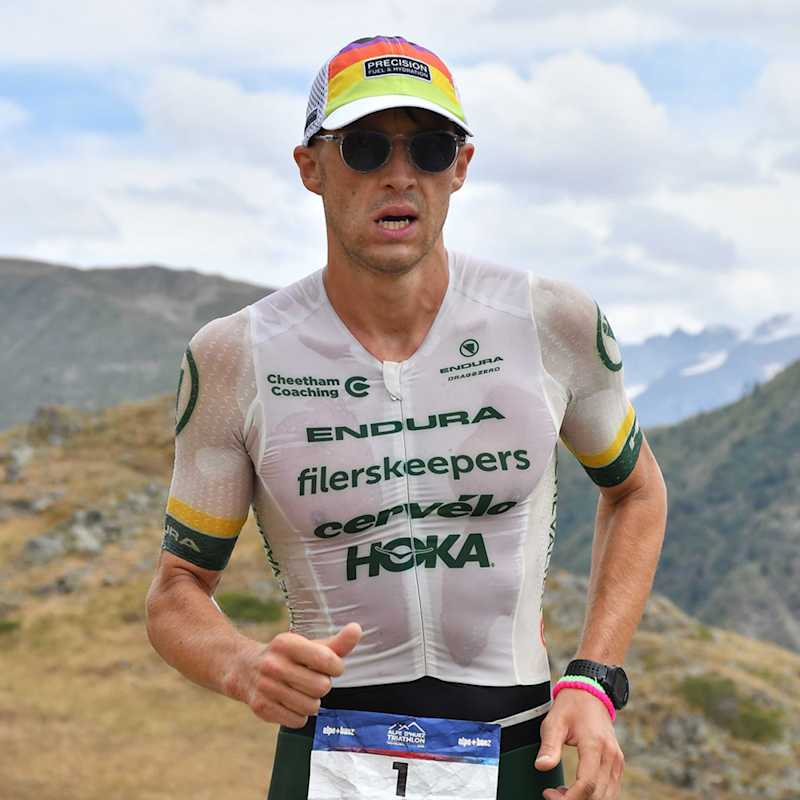
Leon Chevalier
Triath'Long U Cote de Beauté
Leon's headline numbers
Leon's strategy
Fueling
Carbohydrate is the main fuel you burn when racing. Failing to fuel properly is a leading cause of underperformance in longer races.
Leon’s carb intake broke down into ~112g/h on the bike and ~51g/h on the run, reflecting the drop off we frequently see in triathlons as a result of the change in fueling logistics from bike to run and increased GI distress experienced with the mechanics of running. Fortunately for Leon, his high carb intake on the bike would have helped to front-load his energy levels and sustain them going into the first part of the run. This allowed him to go a little less aggressive with his fueling on the third leg of the race. We have seen Leon regularly do this with his fuel strategy, like at Embrunman where he was also successful in his efforts. Fueling primarily through PF 30 Gels, energy drink mix and some caffeinated gels, Leon experienced no GI issues, a testament to his vigorous efforts in gut-training.
Hydration
Taking on board an appropriate amount of fluid and sodium is essential to maintaining blood volume and supporting the cardiovascular effort needed to perform on race day.
Whilst the absolute amount of sodium and fluid consumed per hour is important, it’s critical to consider these in relation to each other. This is known as 'relative sodium concentration' and it’s expressed in milligrams per litre (mg/L). How much sodium you’re taking in per litre of fluid is more important than the absolute amount taken in per hour.
Sweat sodium concentration (mg/L) is largely genetically determined and remains relatively stable. Knowing how salty your sweat is enables you to replace a good proportion of your sweat losses, which can range from 200-2,000mg/L.
Given Leon’s losses are High (1,392mg/L), nailing his hydration strategy becomes especially crucial when it’s hot and/or humid.
Learn moreLeon took on less sodium and fluid than at his prior race at Embrunman, but the conditions this time out were milder, so this is expected. Since he mentioned feeling thirsty, he could have picked up more water or electrolytes from the aid stations on the bike. Although Leon usually opts for Electrolyte Capsules on the run, this time he chose not to. Fortunately, his high sodium concentration on the bike likely carried him through the run. Despite suffering from no cramping during the race, it would be beneficial going forward for Leon to spread his sodium intake out more consistently and supplement the plain water he picks up on the run to prevent the likelihood of suffering from dehydration-related symptoms. Leon didn’t preload with PH 1500, so we would also recommend he consider implementing this strategy before future races to ensure he starts as hydrated as possible.
Caffeine
Beyond the Three Levers of Performance (carb, sodium and fluid), caffeine is one of only a few substances that is proven to improve performance for most endurance athletes as it can help stave off mental and physical fatigue.
Leon’s source of caffeine in this race was predominantly through caffeinated energy gels plus a small amount from cola. Although his intake sits within the scientific recommendations, he said himself that he wishes he had another gel on the run to maximise the ergogenic benefits that the stimulant provides and support his energy levels better.
How Leon hit his numbers
Here's everything that Leon ate and drank on the day...
Leon's weapons of choice
Final thoughts
Leon's full stats
Data Confidence?
There is good confidence in the accuracy of the data reported. An athlete feels that the numbers closely reflect what they consumed despite a couple of estimations which may carry some degree of error. The majority of what was consumed is recorded to a high level of specificity (most volumes are known through the use of bottles brands quantities flavours). The numbers are very plausible and align with previous data recordings (if an athlete has collected data previously).